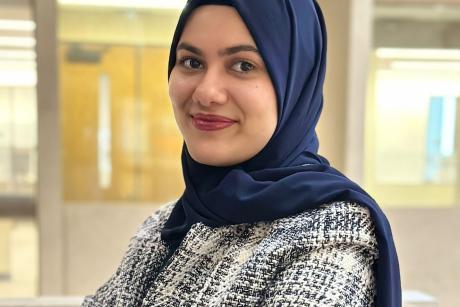
The nutrition intervention will build on research conducted by David Boyd's student research training (SRT) team in Santa Cruz la Laguna, Guatemala. In this photo, global health major Okechi Boms is measuring the circumference of a child's head.
Published November 17, 2015 under Research News
According to David Boyd, associate professor of global health, millions of dollars have been spent in Guatemala to fight stunted growth, and yet the funding and interventions have had virtually no impact. That’s why he’s leading the development of a research-based, culturally appropriate nutrition intervention to address this prevalent and persistent issue in the poorer communities surrounding Lake Atitlán in Guatemala.
Passion and Expertise from Multiple Partners to Help Bring Intervention to Fruition
Last year, Boyd connected with Gabriela Asturias, a Duke junior from Guatemala City, who reached out to him after learning about his extensive research in her home country. Asturias, a pre-med student majoring in neuroscience, is passionate about improving health conditions in Guatemala and was exploring meaningful, long-term options for achieving this goal.
Shortly after they met, Boyd and Asturias began brainstorming ways to build on Boyd’s previous research in Guatemala to promote sustainable positive changes for the communities in Santa Cruz la Laguna. The idea to develop and implement a two-year longitudinal nutrition intervention study geared toward improving the physical and cognitive development of children in Guatemala eventually emerged from these conversations and consultation with other partners.
The current team includes other Duke students; Alyse López-Salm, health education specialist in the Duke School of Medicine; Elaine Bennett, assistant professor of anthropology at Saint Vincent College; and ODIM Guatemala, a Guatemala-based organization that provides medical services, health education and scholarships. In the future, Boyd and Asturias also hope to engage university students from Guatemala in the project.
Nutrition Intervention Will Target Children Ages 0-5
The intervention will be based on findings from Boyd’s and Bennett’s extensive research on rural Guatemalan populations as well as evidence-based interventions that have been implemented successfully in other settings. The team’s goal is to ensure that the intervention will meet the specific needs and reflect the cultural values of the San Juan and San Pedro la Laguna communities, where the program will be delivered.
“Our intervention will incorporate best practices used in the rest of the world and adapt them to meet the needs of rural communities in Guatemala,” said Boyd.
The intervention will incorporate education and training in four primary areas:
- Use of culturally acceptable whole foods to supplement dietary deficiencies
- Food preparation, breastfeeding and feeding practices
- Sanitation, hygiene and use of purified water
- Cognitive stimulation techniques to improve children’s intellectual development
Watch this video to learn more about the intervention.
Private and Crowd-Source Funding Behind the Project
The project is funded through a $10,000 grant from the Tigo Foundation, a Guatemala-based non-profit organization focused on health, education and special projects, as well as a successful Indiegogo campaign that raised more than $7,000.
Funds will be dispersed through a new non-profit organization, Desarrolla Guatemala Foundation, founded by Boyd and Asturias and linked to the Duke student organization Desarrolla.
Desarrolla and its New Foundation Are Ground Zero
Driven by her love for Latin America and Guatemala in particular, Asturias co-founded Desarrolla last year with Camila Vargas, a sophomore psychology major from Colombia, to encourage partnerships between the Duke community and entities in Latin America. Ultimately, their goal is to inspire others at Duke to think of Latin America as a region of opportunities and empowered communities and explore ways to contribute to its development.
Asturias and Boyd, along with Guatemalan Duke alumni and other Guatemalans, created the foundation to help operationalize this goal. The foundation’s work includes:
- Funding community-based participatory research in rural Guatemalan communities
- Developing and implementing culturally sensitive, sustainable interventions that empower rural communities
- Exposing Guatemalans to this model of community service and the reality of surrounding rural communities
In addition, Asturias would like to see Desarrolla and the foundation fulfill her vision of authentic local partnership to address core community issues. “The way to solve a problem is not just to impose a solution on the community,” she said. “I believe we must work with community members to establish and achieve their desired outcomes. You have to take the time to get to know them and understand their needs and their ways of thinking.”
To learn more about Desarrolla or the foundation, contact Asturias.


